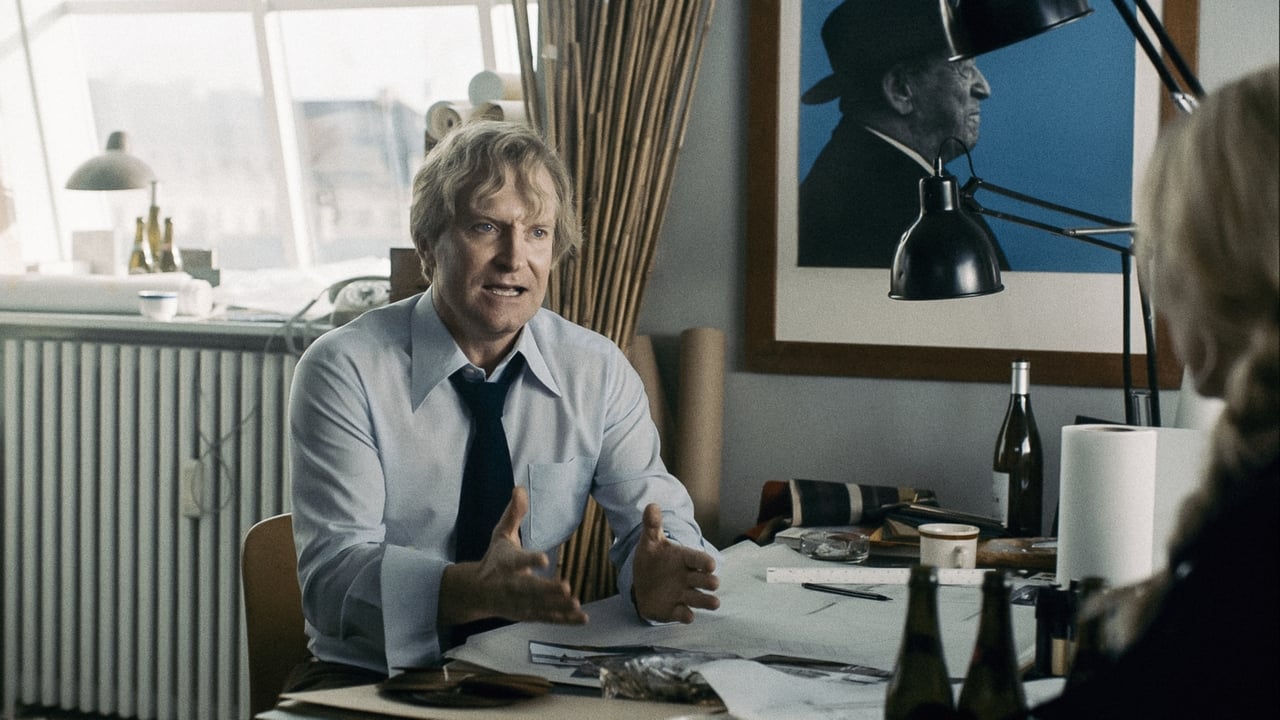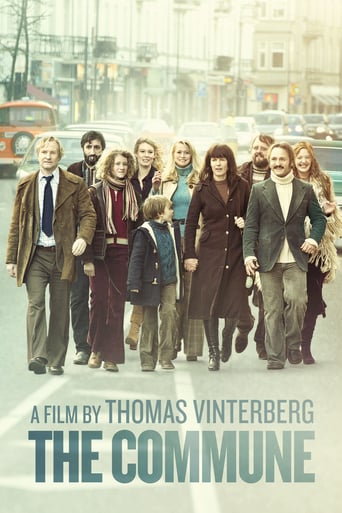

Thomas Vinterberg performs an experiment / study of the human personality by gathering a gallery of characters (with whom it is difficult to identify yourself personally) and placing them in an extreme situation of coexistence. The supposed pragmatism or cold- blooded of Nordic people to face problems, here blows up. The ability of the director makes the viewer to take part inadvertently in the plot of the film as one more character of his work. Anna, TV presenter. and Erik professor of architecture form together with his teenage daughter an apparently happy family with no more complications than "the problem" of managing the use of a big inherited house. So great the house that they decide to share the use. The new experience begins with great joy but ends up in a dramatic way by crushing the promoter of the idea of sharing the house. It is interesting to observe the behavior of the teenage daughter through the story and also trying to understand how difficult it can be for a teacher accustomed himself to dominate students and situations from a position of strength to have to give up the domain of his house and almost his way of life for the general interest of a group composed by people whose specific weight is equal to nothing; the parasite that barely contribute, the "bums" that do not compromise themselves in anything, a liberal couple contributing to the experiment with a sick child who possibly might have been better brought up in the privacy of a normal home, etc. In summary, this film is full of teachings and is a great exercise in the expression of different behaviors, through the coexistence of a group of people with whom (out of the movie) it would be difficult to establish a friendship and still less to share your life. Finally highlight the great interpretation of the wife versus the weak of Erik's lover. talking of actresses terms, of course. The plot is set in 1970 but this fact is totally irrelevant.
... View MoreThe film is set in 1970s Denmark, when idealists launched communes as a love-loving, open counterweight to the conflicts of and over the Vietnam war. Today the film reflects upon the challenge that human emotions and relationships bring to any theory of social planning. Though set in the 70s it's clearly about the post-commune age of today as well. However strong the spirit or idea, the flesh, the human reality, may well prove too weak to sustain it. Write in your own contemporary context. The commune spirit is personified by Anna. She has the idea of turning her husband Erik's inherited family estate into a commune so they and their teenage daughter Freja can afford to live there. Erik is an architect, a builder, though his professional career still requires him to teach. Anna is a well-known TV news presenter, an observer not a maker of news or structures. In inviting family friend Ole to join she launches the commune over her husband's concerns. Anna most visibly enjoys the spirited life in the commune. The observer's venture into building seems at first to work. But despite all that new idealism, the old male privilege persists. Erik may extravagantly deny being any "boss" and he signs over his ownership of the estate to the commune. But in the crunch he asserts his authority to admit his new mistress to the commune, at whatever pain to Anna. In her idealism Anna suggested his Emma move in, but her emotion at her loss of Erik and her sense of her own fading beside her young successor defeat her resolve. The modern sophisticated commune proves essentially tribal when its founder Anna has to move out to allow Erik's peaceful life with Emma. Men are so privileged that even the little boy with the heart condition uses his weakness ("I'm going to die before I'm nine") to hustle women. Including Emma, at first sight: "You want to shag?" His heart finally gives out when his more practical romantic chance, Freja, brings her boyfriend to dinner. In her New Age womanhood Anna tries to accept her husband's affair with the pretty third- year (i.e., really young) student. She even treats her rival warmly. But her valiant effort can't stand up to her emotional needs. She crumbles on air, then shatters the dinner table peace when she declares her own emotional needs. Erik's more violent emotional eruptions are excused but not Anna's. The temperamental male here even gets to faint! Anna is fired for her first freeze. Fired, humiliated, shattered, she luckily has her daughter's trust and confidence — which empowers her to move out of her idealized construction and take on the real world on her own. How she will fare we don't know, because the film opts for the happy ending of the commune, carrying on without her. But there's still another scene. Daughter Freja leaves the family to go to her boyfriend. He's older but rather vacuous in looks, character, wit, manner, but he accepted her sexual initiative. In the last scene she finds him lying stoned at a party so she snuggles up. He offers her headphones to join his experience and doesn't hear her "I love you." Like her mother, Freja constructs an idealized, romanticized connection and invests herself in it, to her own peril and eventual cost. Like Freja later, Emma took the sexual initiative with her professor with the delusion she's empowered by submitting to the supposedly impressive male. She comes to his office disturbed at his humiliation of her male student friend. She even puts up with the prof's arrogant dismissal of her own project proposal. She needs to plumb her own emotional experience, the up-tight unproven architect insists. Claiming to detect a more sensitive inner guy, she invites his kiss.The 1970s setting allows for another ironic presence: the swarthy Allon, a broke, jobless, helpless loner, whose testiness at the admission interview provokes Erik's anger. By crying, Allon converts the commune's rejection to admission, even though he can't pay his share and seems incapable of making any significant contribution — until he magically produces the collective's desired dishwasher! No contemporary representation of a European society could omit the refugee factor. Allon is a vulnerable outsider, anticipating the Muslim refugee issue we recognize today in fuller form.
... View MoreA middle class Danish couple find that they have inherited a rather grand house on the death of Erik's father. It is going to be too big for them and their only daughter and more over too hard to finance and so Anna suggests they invite a few others to live with them and for a 'Kollektivet' or as we would call it a commune. They waste little to no time in getting an assorted array of waifs and not so strays and soon fine that communal living bring challenges and opportunities in equal measure. Not all of them are going to be easy to grasp and the tensions, that go hand in hand with any social experiment, waste no time in pushing their way to the fore.Now I really liked this, I loved the idea of a commune having spent time in one in the eighties (when they were a bit passé to be honest) and the themes are explored here but also the lives of the main characters are mostly to the fore. This is Anna played brilliantly by Trine Dryholm – 'The Legacy' and her husband Erik (Ulrich Thomsen – 'The Blacklist') and their young daughter who is growing up much too quickly. His is from director Thomas Vinterberg who brought us 'The Hunt' in 2012 and 'The Celebration' in 1998 and I think he has an eye for style but sometimes struggles to engage, but here I think he has melded all parts of the art very well together to bring a very entertaining watch – recommended.
... View MoreLess difficult to watch then The Hunt or Festen, Thomas Vinterberg's Kollektivet (The Commune) impresses with great cinematography and how successfully it seems to reconstruct the details of the sixties and seventies fashion in Copenhagen, Denmark. But at the same time, it fails to deliver a truly engaging story. It's an interesting story, it's an exotic story, but the situations presented are so unfamiliar for someone who hasn't even considered living in a commune that it simply makes the plot hard to relate to. The Danish director apparently grew in a commune, but that doesn't mean that the story is autobiographical. However, it is pretty obvious that such a subject couldn't be presented so convincingly by someone without the experience of living in a commune. European movies are more and more something of an alternative cinema treat and this movie is a quite a delight from that perspective. The alternative lifestyle of the protagonists is presented in such detail that it doesn't seem forced or artificial. Most of the characters have strong personalities, but these are kind of ignored, as the pace is too quick to stop for them. Ultimately, what truly sticks out in your memory hours even after watching the movie is a very sad love story. A story about allowing extreme changes to your lifestyle and then having to bear all the consequences, with all the associated happiness and tears. "Maybe this is what people use to do in the Northern parts of Europe, I don't know what to say" was the first reaction of someone in the audience that I overheard at the European Film Festival, after the Bucharest opening screening. I kind of agreed. It is quite difficult to relate to a movie about an extreme leftist commune from Denmark. However, if you like strange stories that show with great talent a historical time and place, then The Commune is something you might fully appreciate. Yes, the action could also take place in a more modern setting, as the world is full of communes. However, what really makes this movie watchable is the love invested in recreating the look & feel of a defunct 20th century decade as seen and felt in a Northern Europe capital by a truly talented and hard- working director.
... View More